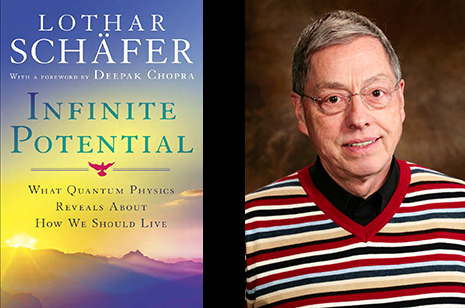FAYETTEVILLE, Ark. — The world of quantum physics expands our grasp of the nature of consciousness, argues Lothar Schafer in his new book, Infinite Potential: What Quantum Physics Reveals About How We Should Live.
Schafer is Distinguished Professor emeritus of physical chemistry at the University of Arkansas.
Infinite Potential shows how we can better understand the relationship among science and our mental and emotional lives, and to lead a happy life we have to live in accordance with the order of the universe, Schafer said. To understand that order, we have to be aware of some simple aspects of the world that were discovered by quantum physics, a branch of physics that deals with physical phenomena at microscopic scales.
Infinite Potential describes these phenomena in an easy language that everybody can understand, he said.
Quantum physics “will open your mind to exciting possibilities,” Schafer writes. “It will show you that you have a potential in you that is boundless.” And it will show you the connection “between the order of the universe and the order of the human world.”
The book details how quantum physics — a branch of physics that deals with physical phenomena at microscopic scales — provides a mathematical description of much of the particle-like and wave-like behavior and interactions of energy and matter.
Most people think that when they look at the things around them they can see what the world is like.
“But the visible world is misleading,” Schafer said. “The seemingly solid things around you, for example, aren't solid at all, but mostly empty space. That is because 99.99 percent of the mass of the atoms out of which all things are made is concentrated in a tiny nucleus, which is 10,000 times smaller than the space that an atom claims for itself.
“If you could take all the nuclei of all the atoms on this globe and stack them together, they would all fit in the area of a football field and its parking lot,” he said. “What is in that space of the atoms that is empty of stuff? It is filled with forms that are invisible but real, because they have the potential to appear in the visible world. For that reason scientists call them ‘forms of potentiality.’”
Potentiality waves don’t carry mass or energy. They are nothing but forms, patterns of information, according to Schafer. When a material particle enters the realm of potentiality, it leaves the empirical world. Nevertheless, potentiality forms are real, because they can express their order in the visible world. They can appear as thoughts in our mind and as things in the external world, he said.
“The basis of the visible world is an invisible, nonmaterial wholeness,” Schafer writes. “Reality appears to us in two domains: the visible world of material things and the invisible realm of potentiality. The visible world is an emanation out of the realm of forms. When material particles dissolve in potentiality waves, they cease being material particles. The basis of the visible world is a realm of hidden images.”
Quantum theory departs from classical mechanics, the set of physical laws describing the motion of bodies under the action of a system of forces. The term classical mechanics describes the system of physics begun by Isaac Newton and many contemporary 17th century natural philosophers.
“The classical science, starting with Newton, is all about materialism,” Schafer said. “Only material things are real. It was so successful that Charles Darwin put it into biology and his theory of evolution. Then, all of a sudden, having stuff or not having stuff was the only thing life is about. That became our public order.
“Quantum physics has been a revolution,” he said. “It has found that reality is really two-fold. The nonmaterial world is a realm of forms. It is even more important than the empirical world because the visible world comes out of this realm of forms.”
Schafer said the nonmaterial world is a cosmic realm.
“The universe is conscious,” he said. “The patterns of information in the background are for its use. You could say physics is the psychology of the universe and psychology is the physics of the mind. We can understand the external world because the forms in our mind and the structures outside come out of the same order. They are congruent. We are all part of the unity, all part of a wholeness.”
Before he retired from the faculty, Schafer developed and taught a course called “Quantum Reality,” which helped students understand the concepts of quantum theory and the life skills that one can learn from them.
“At times the students’ reactions were overwhelming,” he said. “Many of them said that the class changed their outlook on life.”
He met the popular spiritual teacher and medical doctor Deepak Chopra at a conference in Stockholm a few years ago. When he described to him his views of quantum reality, Chopra invited him to write this book.
Infinite Potential is published by Deepak Chopra Books, an imprint of Crown Publishing Group, a division of Random House.
Contacts
Chris Branam, research communications writer/editor
University Relations
479-575-4737,
